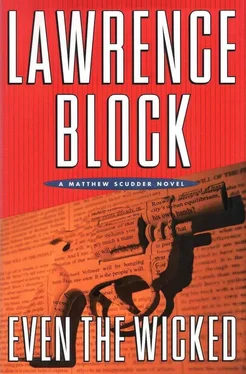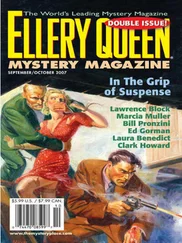“You’d think so,” I said, “but he knew something I didn’t. He knew he wasn’t afraid, and he knew he had nothing to be afraid of.”
“Because Will couldn’t hurt him.”
“Not if he was Will.”
He frowned. “That’s a pretty big leap of logic, wouldn’t you say? He’s pretending to be afraid, therefore he’s not afraid, therefore he’s got nothing to fear. Therefore he’s Will, master criminal and multiple murderer. I don’t remember a whole lot from my freshman logic class, but it strikes me there’s a flaw in the ointment.”
“A flaw in the ointment?”
“The ointment, the woodpile. Maybe he’s not afraid because he’s got terminal cancer and he figures Will’s just doing him a favor.”
“I thought of that.”
“And, since he’s keeping his illness secret from the world, he puts on an innocent act in order to keep you from wondering why it doesn’t upset him more to be Will’s next headline.”
“I thought of that, too.”
“And?”
“I had to admit it was possible,” I said, “but it just didn’t ring true. The motive for subterfuge seemed pretty thin. So what if I didn’t think he was afraid? I’d just figure him for a stoic. But if what he wanted to cover up was the fact that he was Will, well, you could understand why he’d be moved to keep that a secret.”
“Where did you go from there?”
“I took a look at the first murder.”
“Richie Vollmer.”
“Richie Vollmer. Adrian’s client, now free to do it again.”
“Anybody would have gotten Richie off, Matt. It wasn’t Adrian’s doing. The state’s case fell apart when the Neagley woman hanged herself. It’s not as though Adrian handed her the rope.”
“No.”
“You think he felt responsible?”
“I wouldn’t go that far. I think he saw Richie’s release as a gross miscarriage of justice, and I think he read Marty McGraw’s column and came to the conclusion that Marty was right. The world would be a better place without Richie in it.”
“How many people read that column? And what proportion of them found nothing in it to object to?”
“A whole lot of people read it,” I said, “and most of them very likely agreed with it. Adrian had something most of the rest of us lacked. Two things, actually. He’d played a role in Richie’s little dance through the halls of justice, and he could probably find a way to feel at least some responsibility for the outcome. Maybe he’d passed up a chance to get Richie to plead.”
“All right, it’s speculative but I’ll allow it. You said two things. What’s the other one?”
“He had access.”
“To what, the blunt instrument he clubbed him with? Or the rope he used to hang him from the tree?”
“To Richie. Think about it, Ray. Here’s a son of a bitch they caught dead to rights for killing children, and he walks, so now he’s free but he’s a pariah, a fucking moral leper. And you’re Will, a public-spirited citizen determined to dispense rough justice. What do you do, look him up in the phone book? Call him up, tell him you want to talk to him about the advantages of investing in tax-free munis?”
“But Adrian would have known where to find him.”
“Of course he’d know. He was his lawyer. And do you think Richie would refuse a meeting with him? Or be on his guard?”
“You can never predict what a client will do,” he said. “You’re the next thing to a member of their family during the trial, and then it ends in an acquittal and they don’t want to know you. I used to think it was ingratitude. Then for a while I decided it stemmed from a desire to put the experience behind them.”
“And now?”
“Now I’m back to ingratitude. God knows there’s a lot of it going around.” He leaned back in his chair, his fingers interlaced behind his head. “Let’s say you’re right,” he said, “and Adrian had access. He could call Richie and Richie would meet him.”
“And not be on his guard.”
“And not be on his guard. Adrian wouldn’t have to turn up on his doorstep disguised as a twelve-year-old girl. You have anything beside conjecture to place the two of them together?”
“The cops might have the manpower to turn up a witness who saw the two of them together,” I said. “I didn’t even try. What I looked for was the opposite, proof that Adrian was somewhere else when Richie was killed.”
“In court or out of town, for instance.”
“Anything that would give him an alibi. I checked his desk calendar and his time sheets at the office. I can’t prove he didn’t have an alibi, because he wasn’t around to answer questions, but I couldn’t find anything to establish one for him.”
“What about the others? Patsy Salerno was next. Another distinguished client?”
“Adrian never represented him. But a few years ago he had one of Patsy’s soldiers for a client.”
“So?”
“Maybe it gave him a chance to take a strong dislike to the man. I don’t know. Maybe it left him with a contact in Patsy’s circle, someone who might let slip where Patsy was going to be having dinner and when.”
“So Adrian could get there first and hide in the toilet.” He shook his head. “It’s hard to picture him walking in there in the first place, this Waspy guy chasing up to Arthur Avenue for a plate of ziti and eggplant. And how does he hide in the can, and how can he be sure Patsy’s going to answer a call of nature? I’ll grant you Patsy was of an age where you wouldn’t expect him to go too many hours between visits to the can, but you could still spend a long time waiting. And Adrian wasn’t a guy who’d blend in there.”
“More conjecture,” I said.
“Go ahead.”
“Maybe he didn’t try to blend in. Maybe he used who he was instead of trying to disguise it. Maybe he got Patsy’s ear and set up a supersecret meeting.”
“On what pretext?”
“A traitor in Patsy’s ranks. A leak in the U.S. Attorney’s office. A message from somebody highly placed in one of the other crime families. Who knows what he made up? Patsy’d have no reason to be suspicious. The only wire he’d worry about is the kind you wear, not the kind that goes around your neck.”
“He could even let Patsy pick the time and place,” Ray said. “‘I’ll make sure the back door’s unlocked for you. Slip in, and the bathroom’s along the hall on the right.’”
“I don’t even know if there’s a rear entrance,” I said, “but one way or another he’d let Patsy set up a meeting. And he’d make sure Patsy wouldn’t mention it to anybody.”
“So his identity gives him access. Same as with Richie.”
“It strikes me as the best way for him to operate.”
He nodded. “When you think of Will,” he said, “you picture some Ninja gliding invisibly through the city streets. But the best cloak of invisibility might be a three-piece suit. I suppose you looked for an alibi for him for Salerno’s murder? And I don’t suppose he was fly-fishing in Montana?”
“As far as I can tell, he was right here in New York.”
“So were eight million other people,” he said, “and I don’t see you accusing them of murder. What about Julian Rashid? How was Adrian planning on getting into the compound in St. Albans?”
“I don’t know,” I admitted. “Maybe he was working on a plan to lure Rashid out. I know he wasn’t there when Rashid was killed. He spent the evening with” — I checked my notebook — “Henry Berghash and DeWitt Palmer.”
“A judge and a college president? I’d say it’s a damn shame the cardinal couldn’t join them. I don’t suppose the three of them wound up at a leather bar on West Street.”
“Dinner at Christ Cella’s, fifth-row seats for the new Stoppard play, and drinks afterward at Agin-court. A notation in his calendar, backed up with a credit card receipt and a ticket stub.”
Читать дальше












